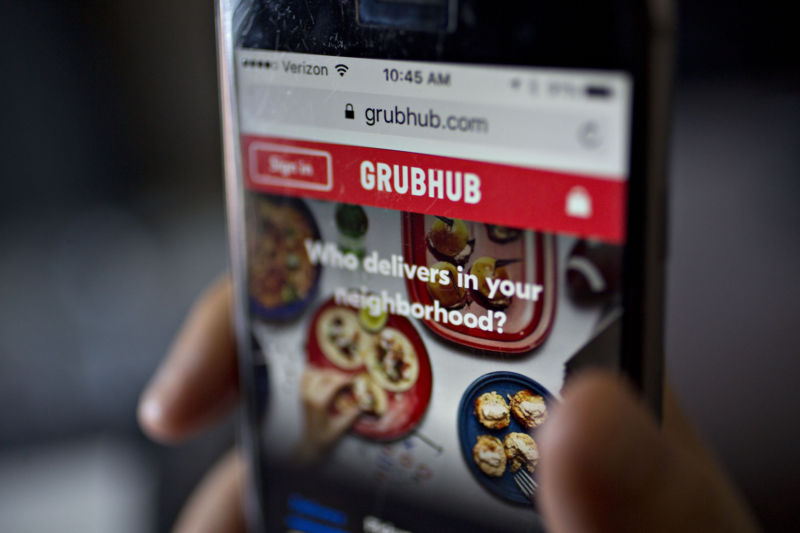[ad_1]

In what is believed to be the first gig economy case to be fully decided on the merits, Grubhub has beaten back a labor lawsuit filed by one of its former drivers.
In a court opinion released Thursday by US Magistrate Judge Jacqueline Scott Corley, “the Court finds that Grubhub has satisfied its burden of showing that Mr. Lawson was properly classified as an independent contractor.”
Both sides had agreed that Judge Corley, rather than a jury, would decide the case in her San Francisco federal courtroom. She heard closing arguments in late October 2017.
The case, Lawson v. Grubhub, involved Raef Lawson, an aspiring actor who made ends meet with various day jobs, sued Grubhub in 2015. He said that he should have been classified as an employee, not a contractor. He sued for back wages, overtime, and expense reimbursement.
The case was originally filed as a proposed class-action lawsuit, but the judge never granted that status, so the it was only limited to him and his claimed $600 in damages. Had Lawson prevailed, the case likely would have set the table for other lawsuits against other similar companies.
Lawson’s lawyer, Shannon Liss-Riordan, has filed numerous such gig economy labor cases in recent years and has yet to substantially prevail. She did not immediately respond to Ars’ request for comment.
“We are very pleased with today’s ruling that the plaintiff was an independent contractor in light of the tremendous freedom and flexibility he enjoyed while using Grubhub’s app,” Michele Maryott, one of Grubhub’s lawyers, emailed Ars in a statement. “Delivery partners gravitate to Grubhub, rather than traditional employment, precisely because of the independence and autonomy they have over their workdays and over their businesses.”
For its part, Grubhub also trumpeted its victory.
“We’re extremely satisfied with today’s ruling in Lawson v. Grubhub, which validates the freedom our delivery partners enjoy from deciding when, where, and how frequently to perform deliveries,” Matt Maloney, Grubhub CEO, said in a statement. “We will continue to ensure that delivery partners can take advantage of the flexibility that they value from working with Grubhub.”
By any other name
Part of what may have doomed Lawson’s own case was that, in Judge Corley’s estimation, in addition to working for other gig economy companies while simultaneously working for Grubhub, he was fundamentally “not credible.”
First, Lawson, by his own admission, “gamed the app” by scheduling himself for a work shift (a “block” in company parlance) but received few, if any, actual delivery orders by putting his phone in airplane mode, among other tactics.
“Mr. Lawson’s claimed ignorance of his dishonest conduct is not credible,” Judge Corley wrote. “Mr. Lawson would remember if after he filed this lawsuit against Grubhub he cheated Grubhub. If he had not moved his smart phone to airplane mode, intentionally toggled available late, or deliberately engaged in other conduct to get paid for doing nothing he would have denied doing so at trial. But he did not.”
Plus, other aspects were not in his favor of being treated as an employee: he could set his own schedule and largely wear whatever clothes he wanted, and he could choose his own route.
But there were elements that weighed in Lawson’s favor.
“Grubhub did control some aspects of Mr. Lawson’s work,” Judge Corley continued. “Grubhub determined the rates Mr. Lawson would be paid and the fee customers would pay for delivery services. While the Agreement states that a driver may negotiate his own rate, this right is hypothetical rather than real. The Court finds that Mr. Lawson could not negotiate his pay in any meaningful way and therefore this fact weighs in favor of an employment relationship.”
The judge seemed to suggest that if there was a case that would challenge whether such gig economy workers should be treated as employees, Lawson v. Grubhub wasn’t it.
“Under California law, whether an individual performing services for another is an employee or an independent contractor is an all-or-nothing proposition,” she concluded. “If Mr. Lawson is an employee, he has rights to minimum wage, overtime, expense reimbursement, and workers compensation benefits. If he is not, he gets none. With the advent of the gig economy and the creation of a low-wage workforce performing low skill but highly flexible episodic jobs, the legislature may want to address this stark dichotomy. In the meantime the Court must answer the question one way or the other. Based on what the Court observed at trial and the facts found, and after applying the Borello test, the Court finds that during the four months Mr. Lawson performed delivery services for Grubhub he was an independent contractor.”
Michael LeRoy, a professor of labor law at the University of Illinois at Urbana-Champaign, told Ars that the case has “limited precedential value.”
“Going forward,” he emailed, “lawyers who bring these types of lawsuits should have reservations about pushing too far or long with a plaintiff who can be shown to cheat and who gives sworn deposition or trial testimony that is not credible.”
[ad_2]
Source link













